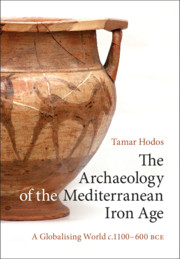Book contents
- The Archaeology of the Mediterranean Iron Age
- The Archaeology of the Mediterranean Iron Age
- Copyright page
- Dedication
- Contents
- Illustrations
- Preface
- Acknowledgements
- One Interpreting the Mediterranean
- Two Chronologies and Histories
- Three The Movement of People
- Four Contacts and Exchanges
- Five Urbanisation
- Six Written Words
- Seven Conclusions
- Notes
- References
- Index
Seven - Conclusions
Published online by Cambridge University Press: 12 September 2020
- The Archaeology of the Mediterranean Iron Age
- The Archaeology of the Mediterranean Iron Age
- Copyright page
- Dedication
- Contents
- Illustrations
- Preface
- Acknowledgements
- One Interpreting the Mediterranean
- Two Chronologies and Histories
- Three The Movement of People
- Four Contacts and Exchanges
- Five Urbanisation
- Six Written Words
- Seven Conclusions
- Notes
- References
- Index
Summary
This volume has focused on certain features – materials exchanged, urban development, the use of writing – because these have been the emphasis of much archaeological research on this period to date, especially with regard to comparative Mediterranean Iron Age colonisation studies. Other aspects could have been examined, such as religion, technology, wealth or identities, aspects that are also of considerable interest to scholarship of this period. These aspects cannot be divorced from an interpretation that incorporates knowledge and understanding of the role Phoenicians and Greeks played in creating such a connected Mediterranean (and the Etruscans, to a more limited extent). Yet in order to demonstrate how globalisation thinking can provide a fresh means of reconsideration of not only the movement of people, but also the impact such movements had on others, it has been necessary to begin with an assessment of where we have come from in our interpretations. For this reason, this volume has emphasised those well-known, perhaps obvious, features of study to demonstrate more clearly and explicitly the utility of a globalisation perspective. As a result, a starting point from which to assess additional aspects has now been established.
- Type
- Chapter
- Information
- The Archaeology of the Mediterranean Iron AgeA Globalising World c.1100–600 BCE, pp. 209 - 222Publisher: Cambridge University PressPrint publication year: 2020



